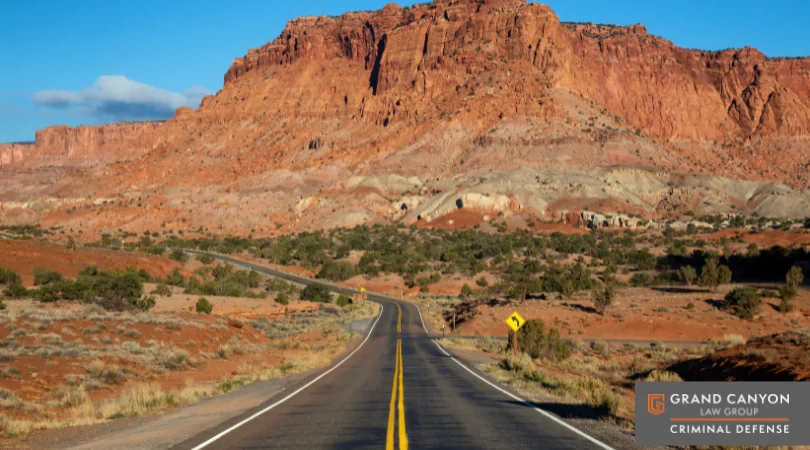The Gabby Petito Case and Domestic Violence Arrests: Did Police Get It Wrong?

The tragic story of Gabby Petito continues to spark discussions about domestic violence investigations, law enforcement responses, and how police determine the primary aggressor in domestic violence cases. With the recent release of the Netflix documentary detailing her case, many people are revisiting the body camera footage and 911 calls from the traffic stop that occurred just weeks before her death.
At Grand Canyon Law Group, we handle domestic violence cases daily and have seen firsthand how these situations unfold in Arizona courts. Today, we’re breaking down what happened during that traffic stop, why police made the choices they did, and how Arizona law approaches similar situations.
The Traffic Stop That Changed Everything
Before Gabby Petito’s disappearance, she and her boyfriend, Brian Laundrie, were traveling across the country in a van. A 911 caller reported seeing a man slapping a woman outside of a store in Utah, which led to police stopping them.
When police arrived at the scene and reviewed the situation, here’s what happened:
- Gabby appeared distressed, crying and apologizing to officers.
- Brian had minor injuries, including scratches.
- Gabby admitted to hitting Brian, but claimed she did not intend to harm him.
- The police labeled Gabby as the primary aggressor and considered charging her with domestic violence.
Rather than arresting either of them, officers separated the couple for the night and allowed them to continue on their way.
Weeks later, Gabby was found murdered, and Brian Laundrie was the primary suspect.
Did Police Make the Right Call?
One of the biggest debates surrounding the case is whether police should have arrested someone that day. Based on the 911 call, Brian was reportedly seen hitting Gabby, yet when police arrived, they treated Gabby as the aggressor.
How Do Police Determine the Primary Aggressor?
In Arizona, like many states, officers responding to domestic violence calls must determine:
- Who initiated the violence
- Who suffered the most serious injuries
- Whether there is a history of domestic violence between the individuals
- If one person acted in self-defense
Police often face difficult decisions in these moments, and they don’t always get it right. Sometimes, the person who is more physically injured is actually the abuser, while the other person was simply defending themselves.
In Gabby’s case, the officers:
✔ Saw visible injuries on Brian
✔ Heard Gabby admit to hitting him
✔ Did not arrest her or Brian
While Arizona law does not require an arrest, officers do have the authority to make one if they believe there is probable cause.
Domestic Violence Laws in Arizona: What Would Have Happened Here?
Under Arizona law (ARS § 13-3601), domestic violence includes any crime committed against a family member, spouse, or romantic partner. This includes:
- Physical assault (hitting, slapping, pushing)
- Threats or intimidation
- Disorderly conduct in a domestic dispute
- Criminal damage (destroying property during an argument)
If this situation had happened in Arizona, police could have:
- Arrested Gabby for misdemeanor assault (ARS § 13-1203).
- Arrested Brian for misdemeanor assault based on the 911 call.
- Charged neither of them and separated them, just like the Utah police did.
Many people believe that if police had arrested Brian, the tragic outcome may have been avoided. Others argue that domestic violence is complex, and arrests don’t always prevent future harm.
The Reality of Domestic Violence Cases
As criminal defense attorneys, we know that domestic violence cases are often messy and emotional. The law does not always account for the full complexity of relationships.
Common scenarios we see in Arizona domestic violence cases include:
✔ Self-defense arrests – A person defends themselves from an abusive partner, but police arrest them instead.
✔ False accusations – Domestic violence claims can be weaponized in divorces or custody disputes.
✔ Mutual combat situations – Both parties are involved in a fight, but one is wrongfully labeled the aggressor.
If you or a loved one is facing domestic violence charges, having the right legal representation can make all the difference.
What to Do If You’re Accused of Domestic Violence in Arizona
If you find yourself in a domestic violence investigation or arrest, here’s what you should do:
✔ Remain Silent – Anything you say can be used against you. Do not try to explain your side of the story without a lawyer present.
✔ Do Not Contact the Alleged Victim – If a protective order is in place, violating it can lead to additional charges.
✔ Hire a Criminal Defense Attorney Immediately – The sooner you have a lawyer, the stronger your defense will be.
At Grand Canyon Law Group, we’ve successfully defended domestic violence charges in Arizona, and we understand both sides of these cases. As former prosecutors, we know how the state builds its case—and how to fight back.
Facing Domestic Violence Charges? Call Grand Canyon Law Group Today
If you or someone you know is facing domestic violence charges, do not navigate the legal system alone. Even minor misdemeanor charges can result in:
- Jail time
- Fines and fees
- Loss of firearm rights
- A criminal record that affects jobs, housing, and family court cases
📞 Call (480) 573-6441 today for a confidential consultation with our experienced Arizona criminal defense attorneys.
📍 Serving clients in Phoenix, Mesa, Scottsdale, Chandler, and across Arizona.
